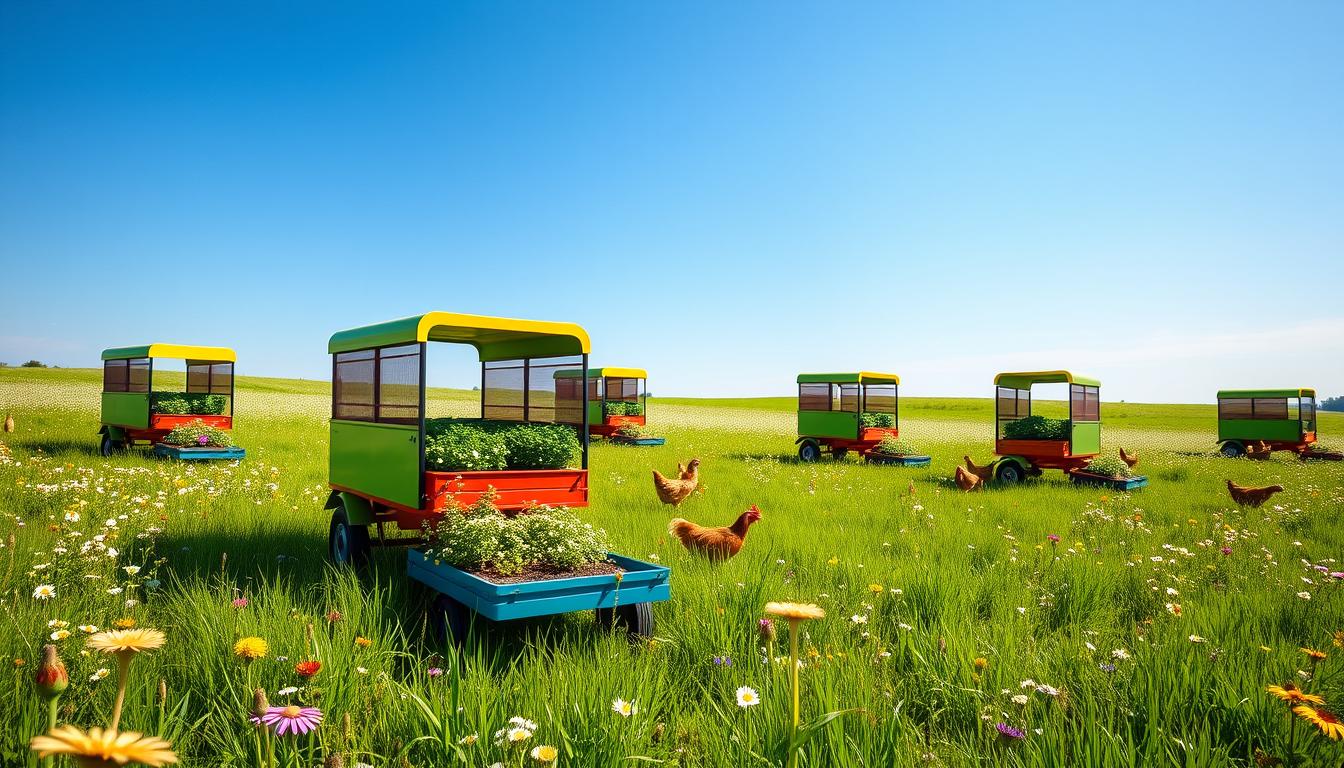Have you ever wondered how to transform your backyard or small-scale farm into a thriving, nutrient-rich oasis? The secret lies in the humble chicken tractor – a revolutionary approach to raising poultry that offers far-reaching benefits for your soil and your entire ecosystem. But what exactly are these mobile coops, and how can they revolutionize the way you think about sustainable agriculture?
Key Takeaways
- Chicken tractors are portable, movable chicken coops that provide a sustainable way to raise poultry.
- These mobile coops can improve soil fertility, boost egg production, and simplify poultry care.
- Integrating chicken tractors into your permaculture or backyard farming system can create a closed-loop, regenerative ecosystem.
- Proper design, management, and rotational grazing are key to maximizing the benefits of chicken tractors.
- Chicken tractors can be used for both egg-laying hens and meat birds, offering versatility for your homestead or small farm.
What are Chicken Tractors?
Chicken tractors are ingenious mobile chicken coops that allow you to easily relocate your flock to different areas of your pasture or garden. These portable structures are designed to promote rotational grazing and help distribute the birds’ manure and scratching for improved soil fertility. Chicken tractors offer a range of benefits for sustainable farming practices and pastured poultry management.
Understanding the Concept
Chicken tractors are essentially movable chicken houses that can be easily pushed or pulled across a field or lawn. They provide shelter, protection, and a controlled environment for your feathered friends, while also enabling them to forage and fertilize the land as they move. This system allows you to rotate your flock to fresh grazing areas, ensuring they have access to a diverse diet and promoting the regeneration of the soil.
Benefits of Mobile Coops
- Reduced feed costs: Chickens in mobile chicken coops can supplement their diet by foraging on fresh pasture, reducing the need for purchased feed.
- Increased egg and meat production: The natural foraging and exercise provided by mobile chicken coops can lead to healthier, more productive birds.
- Simplified poultry management: Moving the mobile chicken coop to different areas of your property eliminates the need for constant cleaning and maintenance in a single location.
- Improved soil fertility: The manure and scratching of chickens in mobile chicken coops help to aerate and fertilize the soil, enhancing its overall health and productivity.
By leveraging the benefits of mobile chicken coops, you can create a more sustainable and efficient farming system that supports both your poultry and the land they inhabit.
Chicken Tractors for Soil Fertility
One of the primary benefits of using chicken tractors is their positive impact on soil health. As the chickens graze, their manure and scratching activities introduce organic matter and essential nutrients back into the soil. This closed-loop nutrient cycling helps build healthy, fertile soil that can support robust plant growth and a thriving ecosystem.
The integration of chicken tractors into a regenerative agriculture system promotes the development of compost and enhances overall soil fertility. The chickens’ natural behaviors, such as scratching and foraging, aerate the soil and incorporate their nutrient-rich droppings, creating an ideal environment for microbial activity and the breakdown of organic matter.
- Chicken manure is rich in nitrogen, phosphorus, and potassium, which are essential macronutrients for plant growth.
- The chickens’ scratching and turning of the soil helps to incorporate the organic matter, improving soil structure and water-holding capacity.
- The mobility of chicken tractors allows for efficient rotational grazing, distributing the manure evenly across the land and preventing nutrient depletion in any single area.
By harnessing the natural behaviors of chickens and integrating them into a holistic farming system, chicken tractors offer a sustainable and regenerative approach to maintaining and enhancing soil fertility. This symbiotic relationship between chickens and the land they graze lays the foundation for a thriving, nutrient-rich ecosystem.
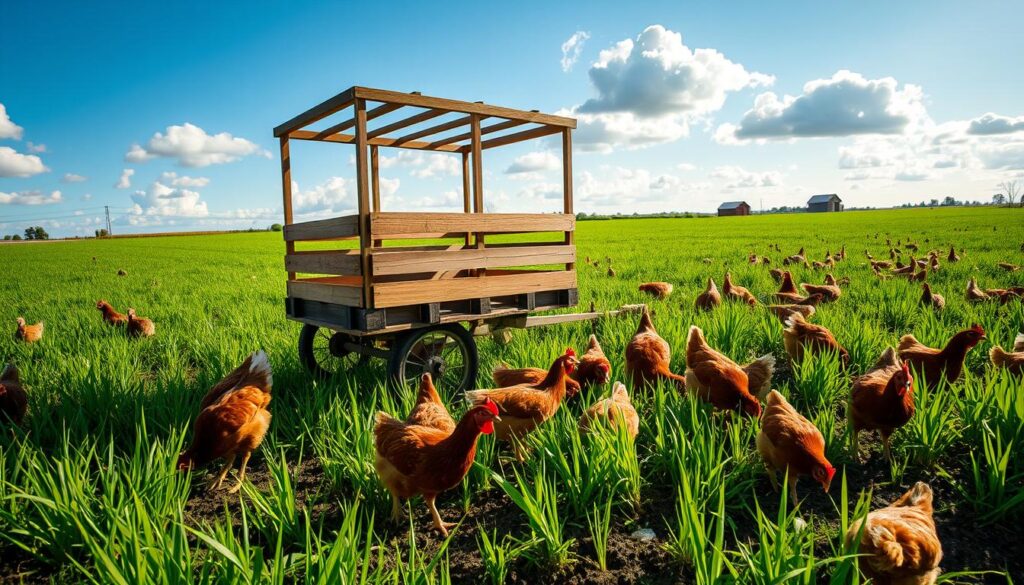
“Chicken tractors are a game-changer for those of us interested in regenerative agriculture. They allow us to harness the power of chickens to improve soil health and fertility, while providing a steady supply of fresh, nutrient-dense eggs and meat.”
– Joel Salatin, renowned sustainable farmer and author
Designing a Chicken Tractor
When it comes to backyard farming, the design of your chicken tractor is crucial. The size and portability of the tractor, as well as the materials used in its construction, can significantly impact the efficiency and productivity of your chicken tractor design.
Size and Portability
The size of your chicken tractor should be determined by the number of chickens in your flock. It’s essential to provide enough space for your birds to move around comfortably, while ensuring the tractor remains lightweight and easy to maneuver. Portable coops allow you to regularly move the tractor to fresh grazing areas, promoting soil fertility and healthy foraging habits.
Materials and Construction
When constructing your DIY chicken tractor, consider using durable and weather-resistant materials, such as wood, metal, and sturdy mesh or netting. The frame should be strong enough to protect your chickens from predators, while the mesh or netting should allow for proper ventilation and sunlight exposure. The overall design should prioritize ease of movement, with features like wheels or skids to facilitate frequent relocation across your small-space permaculture garden.
| Material | Advantages | Disadvantages |
|---|---|---|
| Wood | Affordable, easy to work with, can be repurposed | May deteriorate over time, less durable than metal |
| Metal | Highly durable, weather-resistant, long-lasting | Can be more expensive, heavier to move |
| Mesh/Netting | Provides good ventilation, allows for sunlight exposure | May not offer the same level of predator protection as solid materials |
By carefully considering the size, portability, and construction materials, you can design a chicken tractor that meets the needs of your flock and enhances the overall productivity of your backyard farming endeavors.
“Designing a well-crafted chicken tractor is essential for maximizing the benefits of mobile coops in your small-space permaculture garden.”
Managing a Chicken Tractor
Effectively managing a chicken tractor involves implementing a strategic rotational grazing system. By regularly moving the tractor to a new section of the pasture or garden, you can maximize the benefits of the chickens’ scratching and manure deposition, evenly distributing nutrients and promoting healthy soil and plant growth. This approach not only enhances pasture management but also ensures the well-being of your flock through sustainable livestock practices.
Rotational Grazing
The key to managing a chicken tractor is to establish a rotational grazing schedule. This involves moving the tractor to a new location every few days or weeks, depending on the size of your pasture and the number of chickens. By doing so, you can ensure that the chickens have access to fresh forage, while also preventing overgrazing and allowing the previously grazed areas to recover and regenerate.
- Move the tractor to a new section of the pasture or garden every 3-7 days.
- Adjust the rotation schedule based on the growth rate of the vegetation and the number of chickens in the tractor.
- Monitor the soil and plant health to ensure the chicken tending is effectively enhancing the rotational grazing system.
By implementing a well-planned rotational grazing system, you can maximize the benefits of your chicken tractor and promote a thriving, sustainable livestock operation.
Chicken Tractors for Pastured Poultry
Chicken tractors are the perfect solution for raising pastured poultry, allowing your free-range chickens to roam and forage freely while providing a secure and protective housing structure. This approach to outdoor chicken housing results in healthier, more active birds and higher-quality sustainable meat production.
The mobile nature of chicken tractors enables you to frequently rotate the coop to fresh grazing areas, ensuring your pastured poultry has access to a diverse, nutrient-rich diet. This not only enhances the flavor and nutritional value of the meat and eggs but also helps to improve soil fertility through the chickens’ natural fertilizing activities.
- Promote natural behaviors: Chicken tractors allow your birds to exhibit their natural foraging and exploration instincts, leading to a more enriched and stress-free environment.
- Optimize land use: By moving the coop regularly, you can maximize the efficiency of your land, utilizing a wider area for sustainable meat production.
- Reduce feed costs: As your chickens supplement their diet with insects, grasses, and other foraged items, you can reduce the amount of commercial feed required, lowering your overall operating costs.
Integrating chicken tractors into your permaculture design is a win-win, promoting the health and well-being of your pastured poultry while also enhancing the fertility and productivity of your land. With their versatility and environmental benefits, chicken tractors are an excellent choice for anyone seeking to embrace sustainable meat production and free-range chickens.
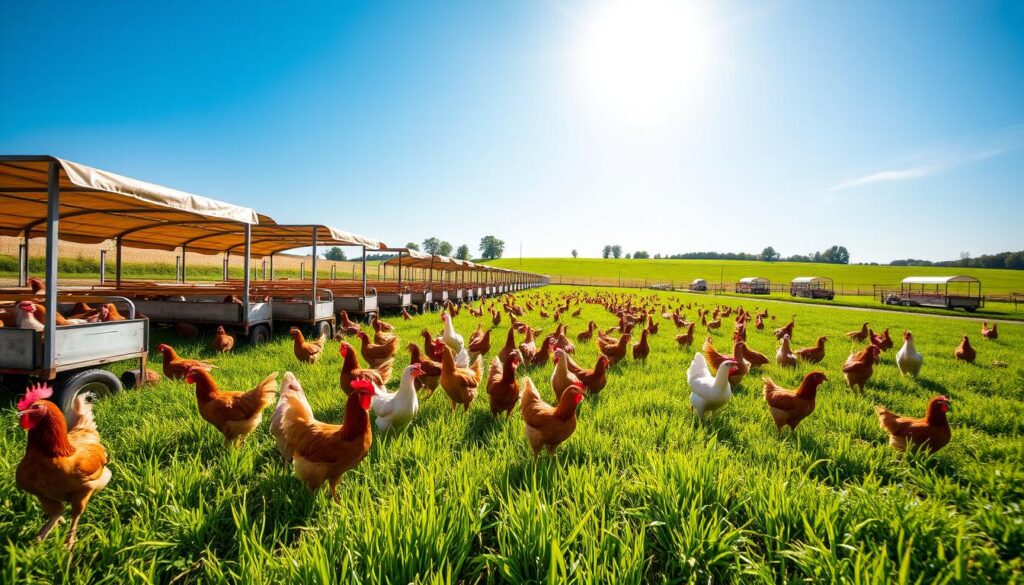
“Chicken tractors are a game-changer for those who want to raise healthy, happy chickens while improving the land they live on.”
Integrating Chicken Tractors into Permaculture Design
Permaculture design and regenerative agriculture share a common goal: to create sustainable, closed-loop systems that mimic natural ecosystems. Chicken tractors, with their ability to enhance soil fertility and support diverse agricultural practices, align perfectly with these principles.
By incorporating chicken tractors into your permaculture design, you can establish a self-sustaining cycle where the chickens’ foraging and manure directly contribute to the health and fertility of the surrounding land. This approach not only improves the soil quality but also helps maintain a balanced, resilient ecosystem.
Closed-Loop Systems
Chicken tractors are an essential component of closed-loop systems in permaculture. The chickens’ manure and foraging activities enrich the soil, providing essential nutrients for your plants and crops. In turn, the plants supply food and shelter for the chickens, creating a symbiotic relationship that minimizes waste and maximizes resource utilization.
Regenerative Agriculture
Sustainable farming practices, such as those found in regenerative agriculture, focus on restoring the soil’s natural vitality. Chicken tractors are a valuable tool in this approach, as they help to break down organic matter, aerate the soil, and distribute nutrients evenly across the land. This process enhances the soil’s ability to sequester carbon, support diverse microbial life, and produce healthier, more resilient crops.
By integrating chicken tractors into your permaculture design, you can create a closed-loop, regenerative system that supports long-term sustainability and the regeneration of natural resources. This approach not only benefits the soil and the surrounding ecosystem but also contributes to the overall resilience and self-sufficiency of your farming operation.
Chicken Tractors for Backyard Farming
Chicken tractors are an excellent option for backyard farmers and urban homesteaders who want to raise their own poultry in a small-scale, sustainable way. Their compact size and mobility make them well-suited for even the smallest of yards, allowing you to enjoy the benefits of fresh eggs and meat while improving the soil in your garden.
One of the primary advantages of using chicken tractors for small-scale poultry in your backyard is the ability to effectively manage the chickens’ grazing and manure distribution. By moving the tractor to a new location regularly, you can ensure that the chickens’ scratching and fertilizing activities are evenly distributed, enriching your soil and promoting healthy plant growth.
For hobby farming enthusiasts, chicken tractors offer a convenient and low-maintenance way to raise a small flock of birds. Their portable design allows you to easily move the coop around your backyard, maximizing the use of available space and minimizing the impact on your landscape.
| Benefit | Description |
|---|---|
| Soil Fertility | Chicken manure deposited as the tractor is moved helps to enrich the soil and improve plant growth. |
| Efficient Space Utilization | The compact size and mobility of chicken tractors make them well-suited for even the smallest backyard spaces. |
| Reduced Waste | Chickens in a tractor system consume their own waste, reducing the need for cleaning and waste disposal. |
Whether you’re a seasoned backyard farmer or just starting your urban homesteading journey, chicken tractors can be a game-changer in your quest for sustainable, small-scale poultry production.
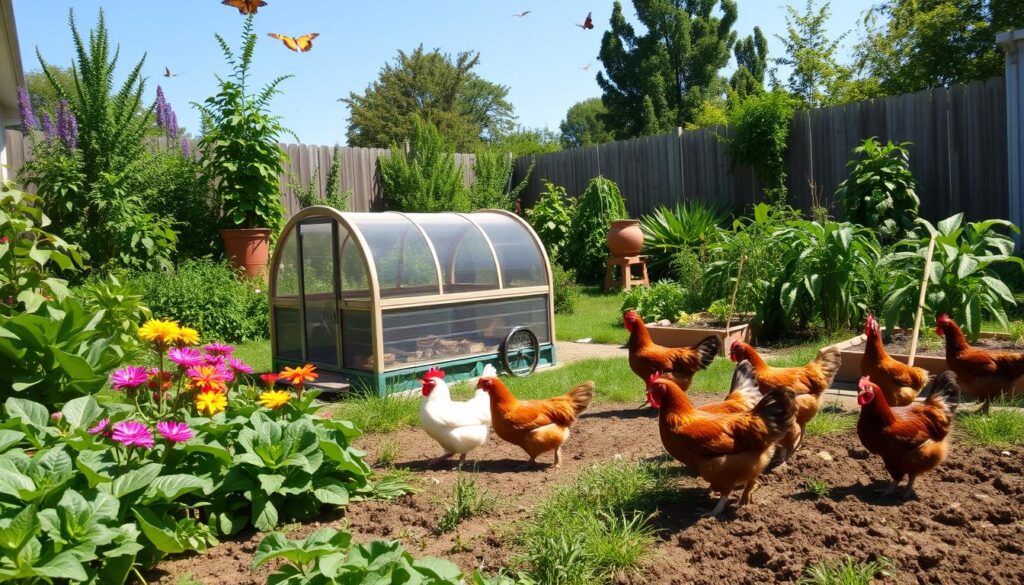
“Chicken tractors have transformed my backyard into a thriving, self-sustaining ecosystem. The mobility and soil-enriching benefits have been a game-changer for my small-scale poultry operation.”
– Jane Doe, Hobby Farmer
Egg Production in Mobile Coops
Chicken tractors can be a game-changer when it comes to egg production. By providing your backyard chickens with frequent access to fresh forage and ample space to roam, these mobile coops can significantly boost the quality and quantity of your pastured eggs.
Considerations for Egg Layers
While the benefits of chicken tractors for egg production are well-documented, there are a few additional factors to consider when housing your laying hens in these mobile structures:
- Nesting Boxes: Ensure your chicken tractor is equipped with enough nesting boxes to accommodate your flock. Hens prefer a secluded, private space to lay their eggs.
- Coop Design: The design of your mobile chicken coop should cater to the specific needs of your egg-laying hens, such as providing adequate roosting space and ventilation.
- Flock Size: The number of hens you keep in a single chicken tractor will impact their egg production and overall well-being. Overcrowding can lead to stress and reduced egg yields.
By carefully addressing these considerations, you can maximize the benefits of chicken tractors for egg production and enjoy a bountiful supply of fresh, nutritious pastured eggs from your backyard flock.
| Egg Production Parameter | Statistic |
|---|---|
| Average Egg Production (Pastured Hens) | 4-5 eggs per week |
| Improved Egg Quality (Pastured vs. Caged) | Higher in omega-3s, vitamins, and antioxidants |
| Increased Egg Shelf Life | Up to 2-3 weeks longer |
“The quality of eggs from hens raised in mobile coops is simply unparalleled. The rich, deep yolks and vibrant orange color are a testament to the benefits of a pasture-based diet.”
– Jane Doe, Backyard Chicken Enthusiast
Meat Birds in Chicken Tractors
Raising meat chickens, also known as broilers, in chicken tractors can be an excellent choice for sustainable poultry production. These mobile coops allow the birds to forage and move freely, resulting in high-quality, flavorful meat while reducing the need for expensive commercial feed.
Chicken tractors provide a more natural, humane environment for meat chickens. By allowing the birds to roam and graze on pasture, they can engage in their natural behaviors, such as scratching, dust bathing, and foraging. This results in pastured poultry that is not only healthier but also more flavorful than conventionally raised broiler production.
One of the key benefits of using chicken tractors for sustainable meat production is the improved soil fertility. As the birds move across the land, their manure helps to fertilize the soil, promoting plant growth and creating a closed-loop system that enhances the overall health of the ecosystem.
“Chicken tractors allow us to produce high-quality, pastured poultry while actively improving the fertility of our soil. It’s a win-win for our farm and the environment.”
When designing a chicken tractor for meat chickens, consider factors such as size, portability, and construction materials to ensure the birds have ample space and protection. Rotational grazing can also be an effective management strategy, allowing the birds to access fresh forage while giving the previously grazed areas time to recover.
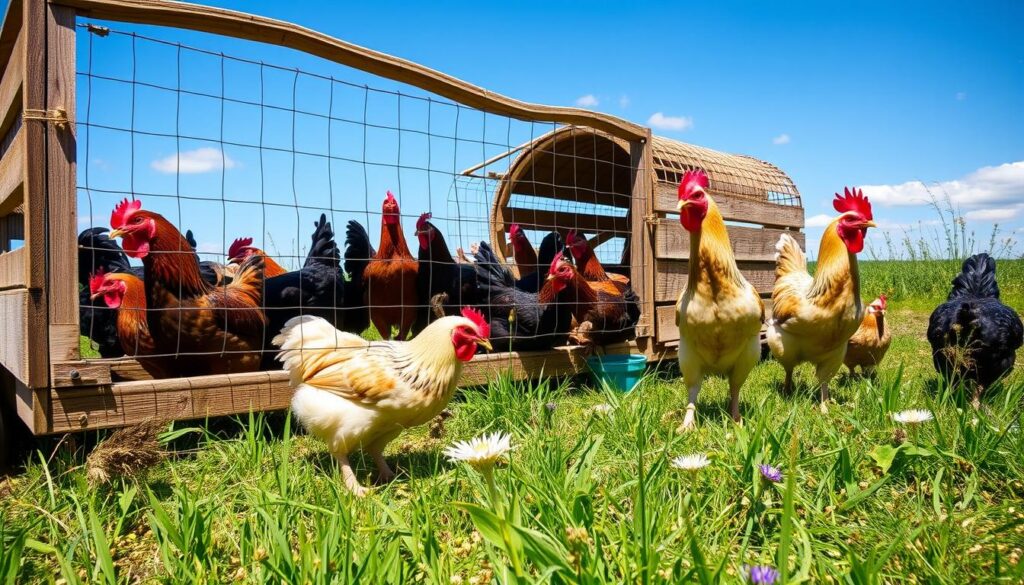
By incorporating chicken tractors into your poultry production, you can unlock the benefits of sustainable meat and contribute to a more regenerative agricultural system. Explore the versatility of these mobile coops and discover how they can enhance the quality and sustainability of your broiler production.
Sustainable Livestock with Chicken Tractors
Incorporating chicken tractors into your farming or homesteading operation is a key component of sustainable livestock management. By leveraging the chickens’ natural behaviors and integrating them into a broader permaculture or regenerative agriculture system, you can create a closed-loop, resource-efficient approach to animal husbandry that benefits both your flock and the land.
Chicken tractors, mobile coops that allow chickens to graze and fertilize the soil as they move across the land, are a powerful tool for sustainable livestock production. These innovative systems help to enhance soil fertility, reduce the need for external inputs, and promote a balanced, self-sustaining ecosystem on your property.
Integrating chicken tractors into your regenerative farming practices can unlock a range of benefits, including:
- Improved soil health through the chickens’ natural fertilization and aeration
- Reduced reliance on chemical fertilizers and pesticides
- Diversified food production with both eggs and meat from your flock
- Enhanced biodiversity and habitat for a variety of plant and animal species
By embracing the principles of closed-loop systems and permaculture design, you can create a truly sustainable livestock operation that works in harmony with the natural world. Chicken tractors are a key piece of this puzzle, serving as a bridge between your chickens, your soil, and your overall agricultural ecosystem.
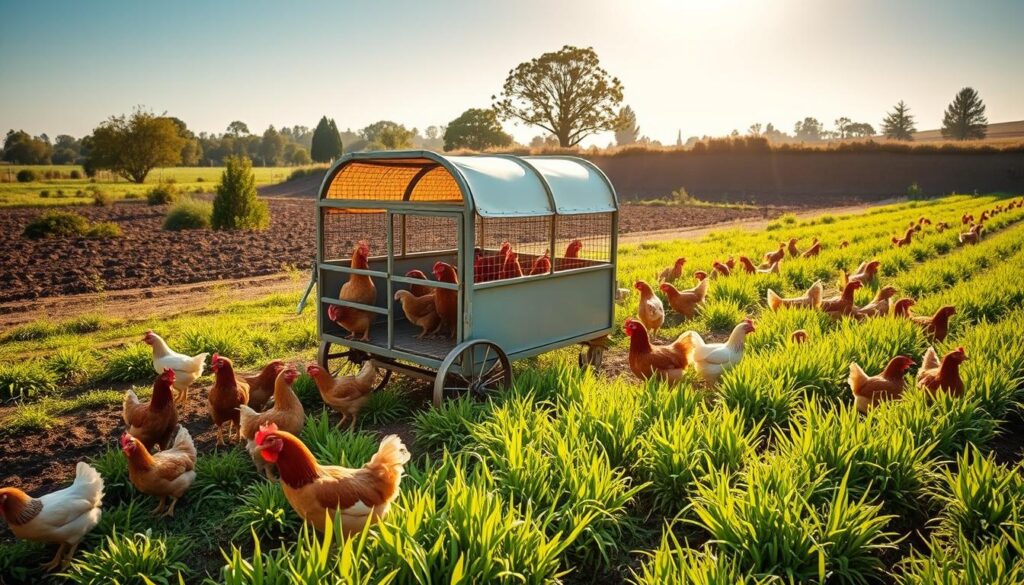
| Benefits of Chicken Tractors | Sustainable Livestock Management |
|---|---|
| Improved soil fertility | Closed-loop systems |
| Reduced need for external inputs | Regenerative agriculture |
| Diversified food production | Permaculture design |
| Enhanced biodiversity | Resource-efficient approach |
“Chicken tractors are a game-changer for sustainable livestock production, unlocking a world of benefits for both the land and the flock.”
Tips and Best Practices
Maintaining a successful chicken tractor system requires attention to key factors like predator protection and ensuring proper ventilation and shade for your flock. By incorporating sturdy, predator-proof fencing and designing the tractor with ample airflow and shaded areas, you can keep your chickens safe and comfortable as they graze and forage.
Predator Protection
Securing your chicken tractor against predators is crucial for the well-being of your birds. Utilize heavy-duty, predator-proof fencing that extends both above and below the ground, creating a barrier that deters coyotes, foxes, and other potential threats. Additionally, consider installing motion-activated lights or alarms to deter predators and alert you to any disturbances.
Ventilation and Shade
Proper ventilation and shaded areas within the chicken tractor are essential for the health and comfort of your flock. Incorporate design elements that promote airflow, such as strategically placed vents or mesh panels, to ensure your chickens have access to fresh air and relief from heat stress. Additionally, provide ample shaded areas, either through the use of a canopy or by positioning the tractor in a partially shaded location, to protect your birds from direct sunlight.

